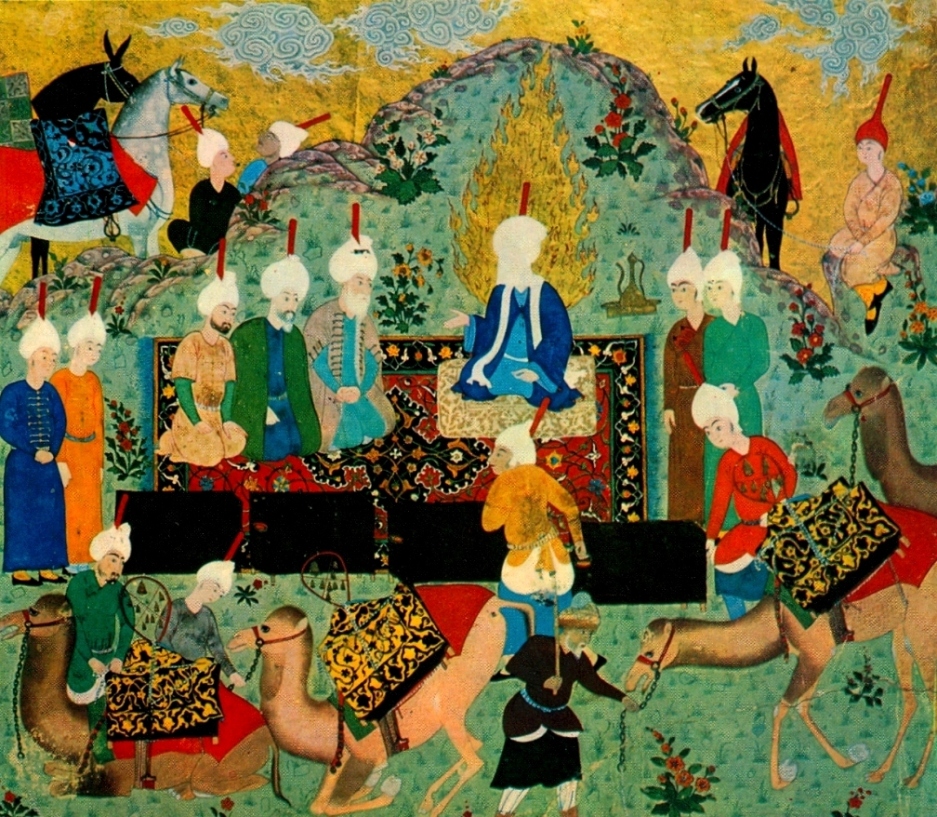Ibn Shu’ba al-Harrani, Tuhaf al-'Uqul, p. 295
Muhammad al-Bāqir: Zitate auf Englisch
“I admonish you regarding five things:”
1) If you are wronged, do not commit wrong doing to others;
2) If you are betrayed, do not betray anyone;
3) If you are called a liar, do not be furious;
4) If you are praised, do not be jubilant;
5) If you are criticised, do not fret and think of what is said in criticism - if you find in yourself what is criticised about you, then you are falling down in the eyes of God; when you are furious about the truth, it is a much greater calamity then your falling down in the eyes of the people. And if you are opposite of what is said (in criticism) about you, then it is a merit you acquired without having to tire yourself in obtaining it.
Majlisi, Bihārul Anwār, vol.75, p. 162
Ibn Shu’ba al-Harrani, Tuhaf al-'Uqul, p. 287
Qur'an, 83:14
Muhammad Kulayni, Usūl al-Kāfī, vol.73, p. 332
Religious Wisdom
Muhammad Kulayni, Usūl al-Kāfī - Book of Faith and Infidelity, vol.3, p. 202 & vol.2, p. 316
“There is no pain worse than ignorance and lack of intelligence.”
Ibn Shu’ba al-Harrani, Tuhaf al-'Uqul, p. 165
“There are three hinges out of the completion of values, of this world and the here-after:”
1) Forgiving the one who has committed excess and aggression against you.
2) Joining the one who cuts off relations and ties with you.
3) Forbearance and tolerance for the one who committed a folly, and showed poor behavior and misconducts towards you.
Ibn Shu’ba al-Harrani, Tuhaf al-'Uqul, p. 293
“Opposition of one's desires is the sign of the highest level of wisdom in a human being.”
Majlisi, Bihārul Anwār, vol.78, p. 164
“Take the good speech from whoever said it even if his practice was not accordingly.”
Majlisi, Bihārul Anwār, vol.75, p. 170
Ibn Shu’ba al-Harrani, Tuhaf al-'Uqul, p. 297
God's decree on him
Ibn Shu’ba al-Harrani, Tuhaf al-'Uqul, p. 295
Religious Wisdom
“Learn knowledge and science from him who teaches it, even if he doesn't practice what he preaches.”
Ibn Shu’ba al-Harrani, Tuhaf al-'Uqul, p. 299
Muhammad Kulayni, Usūl al-Kāfī, vol.2, p. 84
Religious Wisdom
“Being sociable and affable with people brings kindness and friendship.”
Ibn Shu’ba al-Harrani, Tuhaf al-'Uqul, p. 306
Ibn Shu’ba al-Harrani, Tuhaf al-'Uqul, p. 294
“Being religious equals being extremely loving, and being extremely loving equals being religious.”
[Mizan al-Hikmah, Muhammadi Reishahri, Muhammad, Dar al-Hadith, 2010, 2, Qum, 425]
Muhammad Kulayni, Usūl al-Kāfī, vol.2, p. 234
Majlisi, Bihārul Anwār, vol.74, p. 86
Muhammad Kulayni, Usūl al-Kāfī, vol.2, p. 23
“On the Day of Judgement, God will interrogate people according to the wisdom he has granted them.”
Majlisi, Bihārul Anwār, vol.1, p. 106
Al-Khisal, p. 60
[Baqir Shareef al-Qurashi, Jasim al-Rasheed, The Life of Imam Muhammad ibn 'Ali al-Baqir, His traditions from the Prophet, 1999]
“Two kinds of my community have no share in Islam. (They are): the extremists and the fatalists.”
Al-Khisal, p. 71
[Baqir Shareef al-Qurashi, Jasim al-Rasheed, The Life of Imam Muhammad ibn 'Ali al-Baqir, His traditions from the Prophet, 1999]
Al-Khisal, p. 4
[Baqir Shareef al-Qurashi, Jasim al-Rasheed, The Life of Imam Muhammad ibn 'Ali al-Baqir, His traditions from the Prophet, 1999]
[Mizan al-Hikmah, Muhammadi Reishahri, Muhammad, Dar al-Hadith, 2010, 3, Qum, 114]
